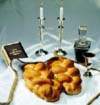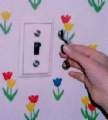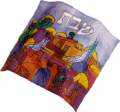BS"D
What might a typical Shabbos schedule be like?

What happens then?
 To keep the Shabbos, you should prepare on Friday, by making sure you have enough food and drink to last you the next 25 hours, or so. Get the kosher wine, the Coca-cola and Empire kosher chickens (fleishig meal, meat meal), kosher challah, the geviltefish, salmon, ect. You should turn on all lights that you will need, ahead of time. At first it will be hard to remember not to turn the lights off during Shabbos, so you may need to buy some Safety switch covers
To keep the Shabbos, you should prepare on Friday, by making sure you have enough food and drink to last you the next 25 hours, or so. Get the kosher wine, the Coca-cola and Empire kosher chickens (fleishig meal, meat meal), kosher challah, the geviltefish, salmon, ect. You should turn on all lights that you will need, ahead of time. At first it will be hard to remember not to turn the lights off during Shabbos, so you may need to buy some Safety switch covers that attach over the switches, these employ the help of snaps, the screws on your switch plate cover go through them and tighten down, then the cover is snapped to those. Until' you can find some, you can employ masking tape if need be. The light bulb in the refrigerator must be unscrewed, so it does not turn on when you open it
that attach over the switches, these employ the help of snaps, the screws on your switch plate cover go through them and tighten down, then the cover is snapped to those. Until' you can find some, you can employ masking tape if need be. The light bulb in the refrigerator must be unscrewed, so it does not turn on when you open it
Since we are commanded to prepare for the Shabbos, to seperate Shabbos from the rest of the week so we can remember to avoid breaking the other mitzvos (commandments), this is why we light Shabbos candles 18 minutes before sunset in preparation of the Shabbos. Many Jewish websites and newspapers contain local candle lighting times. Always try to prepare in advance for Shabbos! As time goes by in your observance, you'll find it gets easier and easier. Consult your Rov (Rabbi) for details! At about 3:00 p.m. on Friday afternoon, observant Jews leave there places of business to begin Shabbos preparations. The mood is much like preparing for the arrival of a special, beloved guest: the house is cleaned, the family bathes and dresses up, the best dishes and silverware are set out, a festive meal is prepared. We also attend the mikveh to do tevilah (immersion)before Shabbos.
18 minutes before sunset in preparation of the Shabbos. Many Jewish websites and newspapers contain local candle lighting times. Always try to prepare in advance for Shabbos! As time goes by in your observance, you'll find it gets easier and easier. Consult your Rov (Rabbi) for details! At about 3:00 p.m. on Friday afternoon, observant Jews leave there places of business to begin Shabbos preparations. The mood is much like preparing for the arrival of a special, beloved guest: the house is cleaned, the family bathes and dresses up, the best dishes and silverware are set out, a festive meal is prepared. We also attend the mikveh to do tevilah (immersion)before Shabbos.
Get a siddur, and some NCSY bentschers at your local Jewish bookstore, you don't know Hebrew yet?, they have transliterated to use until you get the Hebrew mastered) - and enjoy! it's meant as a family time, a time to enjoy life and bless HASHEM for all the things He's does for us. Afterall The Shabbos, our kallah, our bride has come! (singing L'cha Doydi here,,,,haha)
Remember to keep a hall or bathroom light on so you can see later on in order to get ready for bed, then simply shut your bedroom door to keep the light out of your eyes.
Friday evening begins...It's off to walk to Shul for a breif service (about 34 minutes). Com'on you could use the exercise, I know I sure do.
Afterwards, it is time for a festive, leisurely dinner.
Ah, I can hear everyone singing Ashis Chayil (woman of valour) now..
There are three meals on Shabbos, each one is called a "SOODAH" (try saying it). Beforehand, the man of the house recites Kiddush, a prayer over wine sanctifying the Shabbos, this is said over at least 4 oz of kosher wine , or kosher grapejuice in a kiddush cup
, or kosher grapejuice in a kiddush cup that is overflowing. After Kiddush and before the meal, each person in the household preceeds to the kitchen sink for nati'las yodai'yim (washing of hands) by filling a special two handled cup
that is overflowing. After Kiddush and before the meal, each person in the household preceeds to the kitchen sink for nati'las yodai'yim (washing of hands) by filling a special two handled cup  (negel vasser, literally nail water) with water then picking it up with the right hand and switching it to the left hand and pouring it over the top and bottom of the right hand 2 times,and then switching and to the left hand and pouring 2 times also on the right hand. Before wiping the hands dry on a towel, the borucha (blessing) should be recited (use your bentcher again if need be). At this time we are to keep silent , we proceed back to the table and the the head of the household should remove the cover
(negel vasser, literally nail water) with water then picking it up with the right hand and switching it to the left hand and pouring it over the top and bottom of the right hand 2 times,and then switching and to the left hand and pouring 2 times also on the right hand. Before wiping the hands dry on a towel, the borucha (blessing) should be recited (use your bentcher again if need be). At this time we are to keep silent , we proceed back to the table and the the head of the household should remove the cover from the two challah loaves
from the two challah loaves
 , lifting them while reciting the borucha (blessing)over the bread (hamoytzi lecham). The challah bread is cut and dipped in salt and a piece is usually passed in a basket each person at the table. After everyone has a piece and has taken a bite we can resume speaking. (The natilas yodai'im and the hamoytzi together are a unit, and we should refrain from speaking when doing this even during the weekdays).
, lifting them while reciting the borucha (blessing)over the bread (hamoytzi lecham). The challah bread is cut and dipped in salt and a piece is usually passed in a basket each person at the table. After everyone has a piece and has taken a bite we can resume speaking. (The natilas yodai'im and the hamoytzi together are a unit, and we should refrain from speaking when doing this even during the weekdays).
There is normally a fish plate (which is smaller) set on top of your main course plate, geviltefish and salmon are usually the 1st course. The main course is usually nice kosher chicken.
Meals are generally stewed or slow cooked items, because of the prohibition against cooking during the Shabbos. (Things that are mostly cooked before Shabbos and then reheated Fri evening and saturday on a prewarmed burner, which is allright. Pass the cholent, please!, yum!!!!).
During dinner we talk about all kinds of wonderfull things, in which the current Torah Parsha is the most important topic.
However..Remember... Put a brake on Lashon Hara (the evil tongue, i.e. gossip.)
After the sooda (shabbos meal), the birkas ha-mazon (grace after meals) is recited, this borucha can be found in your
 bentscher
bentscher 
(NCSY makes a good one, and a good transliterated one for those that have not mastered Hebrew yet).We do this every day, however, on the Shabbos, it is done in a relaxed manner with many joyous tunes. A tune for this time is called a "Shabbos zimun".
We eat three meals (soodahs) on Shabbos, one usually after Shul on Friday evenings, the second is saturday after we come home from Shul in the early afternoon, after eating it is good to discuss Torah, and you can relax and play games like ma jong and relax. then it is back to Shul for the afternoon service. Ma'ariv (which is the evening prayer, the third prayer time of any day)ends the service. The third meal (soodah) is usually eaten at Shul.(eating this third soodah at The Shul is more of a Chossidish'e custom however).
When you can see at least three stars in the sky . At this time we do havdollah., the married men rush home to do havdallah for there wives, while the bocher'eem stay at Shul with the rest of the group.
BACK TO THE ARTICLES INDEX
© Copyright 1999 by ©T.O.M.J BEIS Orthodox Messianic



 that attach over the switches, these employ the help of snaps, the screws on your switch plate cover go through them and tighten down, then the cover is snapped to those. Until' you can find some, you can employ masking tape if need be. The light bulb in the refrigerator must be unscrewed, so it does not turn on when you open it
that attach over the switches, these employ the help of snaps, the screws on your switch plate cover go through them and tighten down, then the cover is snapped to those. Until' you can find some, you can employ masking tape if need be. The light bulb in the refrigerator must be unscrewed, so it does not turn on when you open it
 18 minutes before sunset in preparation of the Shabbos. Many Jewish websites and newspapers contain local candle lighting times. Always try to prepare in advance for Shabbos! As time goes by in your observance, you'll find it gets easier and easier. Consult your Rov (Rabbi) for details! At about 3:00 p.m. on Friday afternoon, observant Jews leave there places of business to begin Shabbos preparations. The mood is much like preparing for the arrival of a special, beloved guest: the house is cleaned, the family bathes and dresses up, the best dishes and silverware are set out, a festive meal is prepared. We also attend the mikveh to do tevilah (immersion)before Shabbos.
18 minutes before sunset in preparation of the Shabbos. Many Jewish websites and newspapers contain local candle lighting times. Always try to prepare in advance for Shabbos! As time goes by in your observance, you'll find it gets easier and easier. Consult your Rov (Rabbi) for details! At about 3:00 p.m. on Friday afternoon, observant Jews leave there places of business to begin Shabbos preparations. The mood is much like preparing for the arrival of a special, beloved guest: the house is cleaned, the family bathes and dresses up, the best dishes and silverware are set out, a festive meal is prepared. We also attend the mikveh to do tevilah (immersion)before Shabbos.
 , or kosher grapejuice in a kiddush cup
, or kosher grapejuice in a kiddush cup that is overflowing. After Kiddush and before the meal, each person in the household preceeds to the kitchen sink for nati'las yodai'yim (washing of hands) by filling a special two handled cup
that is overflowing. After Kiddush and before the meal, each person in the household preceeds to the kitchen sink for nati'las yodai'yim (washing of hands) by filling a special two handled cup  (negel vasser, literally nail water) with water then picking it up with the right hand and switching it to the left hand and pouring it over the top and bottom of the right hand 2 times,and then switching and to the left hand and pouring 2 times also on the right hand. Before wiping the hands dry on a towel, the borucha (blessing) should be recited (use your bentcher again if need be). At this time we are to keep silent , we proceed back to the table and the the head of the household should remove the cover
(negel vasser, literally nail water) with water then picking it up with the right hand and switching it to the left hand and pouring it over the top and bottom of the right hand 2 times,and then switching and to the left hand and pouring 2 times also on the right hand. Before wiping the hands dry on a towel, the borucha (blessing) should be recited (use your bentcher again if need be). At this time we are to keep silent , we proceed back to the table and the the head of the household should remove the cover from the two challah loaves
from the two challah loaves
 , lifting them while reciting the borucha (blessing)over the bread (hamoytzi lecham). The challah bread is cut and dipped in salt and a piece is usually passed in a basket each person at the table. After everyone has a piece and has taken a bite we can resume speaking. (The natilas yodai'im and the hamoytzi together are a unit, and we should refrain from speaking when doing this even during the weekdays).
, lifting them while reciting the borucha (blessing)over the bread (hamoytzi lecham). The challah bread is cut and dipped in salt and a piece is usually passed in a basket each person at the table. After everyone has a piece and has taken a bite we can resume speaking. (The natilas yodai'im and the hamoytzi together are a unit, and we should refrain from speaking when doing this even during the weekdays).


 bentscher
bentscher 